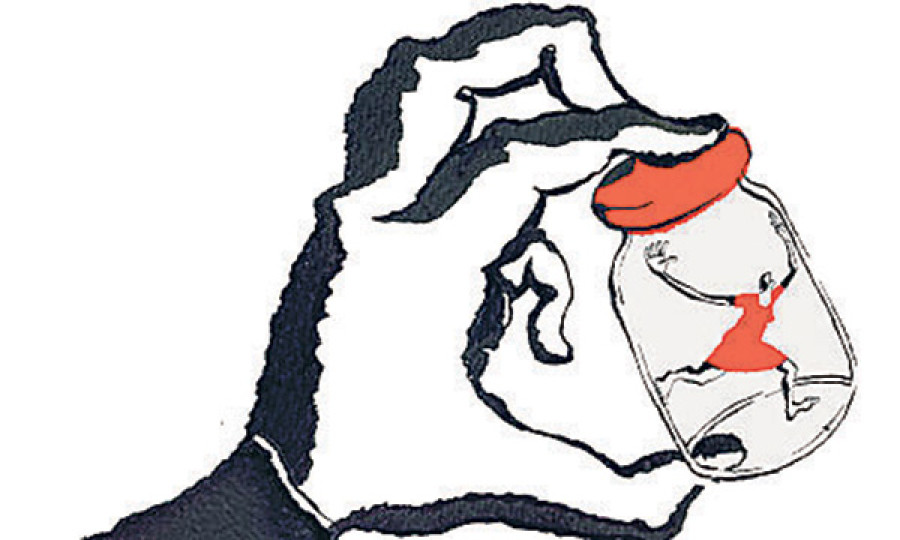Opinion
Masculinist logic
The proposed ‘and’ provision in granting citizenship insults autonomy of adult subjects who are rightful residents of Nepal.
Archana Thapa
Not just conjunction
After the signing of the Comprehensive Peace Agreement in 2006, Nepal witnessed major progressive changes. But before singing praises to those changes, it is crucial to ask how many people exactly have benefited from those changes made and institutionalised in the Interim Constitution. Take, for example, the approximately 3.5 million people who are currently stateless in Nepal. Those people, obviously, have not been recipients of the gains brought about by the changes that liberal enthusiasts boast so often of.
The debate concerning citizenship rights may seem like a simple issue to some people but for many, citizenship is much more than a piece of paper. The acquisition of citizenship secures a person’s privileges in a nation, reminds one of national duties, provides a respectful national status, and above all, signifies the state’s confirmation that the person is not an alien.
The piece of paper signifying a state’s authorisation is so powerful that it can accept a person as a member of a community or bar him/her as an alien. Hence, a citizenship can mean all of the above and more to a person, both politically and psychologically.
For these reasons, the issue of citizenship is not simply a contention relating to the conjunctions ‘or’ and ‘and’ (mother ‘or’ father clause, or mother ‘and’ father clause); this debate is bigger than that. It relates directly to citizens without citizenship who, as many claim, are either single mothers or children from single mothers. If political leaders backtrack from their democratic promises and reverse the procurement Clause 8 (2) (b) of the Interim Constitution, single mothers, women abandoned by their family members, divorced women as well as children born out of wedlock and rape will suffer the most.
By men, from men
Throughout human history, women across the globe belonging to different classes, races, ethnicities, and religions have been denied citizenship on many pretexts. In Nepal also, an attempt is afoot to reverse the aforementioned clause into a more regressive one. Such matters are not only about depriving women of the political right to confer citizenship to their children, but also about the mindset of male political leaders who are driven by a masculinist logic of protection. This logic rests on the subordinate status of those who allegedly need protection because they are weak, dependent, and irrational.
This logic of national protection reminds me of American actress Mae West’s line, “Every man I meet wants to protect me. I can’t figure out what from?” West’s question itself provides the answer, “From men”. A similar rationale of protection from other ‘men’ and the paranoia of national disintegration is working against the Interim Constitution, causing contention over the ‘or’ and ‘and’. It is sad and interesting at the same time to see how masculinist leaders understand contemporary Nepali women—as weak and irrational subjects—who, by
marrying a bideshi or men from across the border, can jeopardise national interests.
Under stereotypical gender roles, the man of the house takes up the role of protector and in return, expects obedience and loyalty from his women folk and children. Similarly, as the men of the nation, leaders step into the traditional role of the masculine protector and spread fears of national security. They forget that the women too cast their vote to elect them as leaders and that they are undermining women as autonomous subjects by considering them ‘dependents’.
Autonomy of adults
Concepts of gender equality, democracy, and equal citizenship rights are fundamentally interrelated in terms of the opportunities, rights, and duties they promise and prescribe for all citizens, irrespective of their class, ethnicity, gender, and geographical location. Political leaders, however, often interpret the meaning of these fundamental concepts to suit their own interests and convenience. For the first time in Nepali history, the revolutionary spirit of 2006 led to a constitutional assurance of citizenship in the mother’s name. But now that that spirit has ebbed, amendments are being sought to reverse this progressive provision.
There is no denying that every change invites unexpected political, theoretical, and legal challenges and threats, but intensifying fears of national disintegration and backtracking from democratic promises will not solve the problem. The need is to explore newer strategies and develop policies to counteract those threats. People’s right to citizenship is the highest fulfilment of democratic and egalitarian aspirations and a fundamental right like this should not be based on gender. The democratic system requires leaders to respect the autonomy of all adult members of the national community and secure their equal rights.
So the debate on ‘or’ and ‘and’ is not a mere contest of conjunctions; it is much more complex. It is influenced by an ideological mindset that supports stereotypical gendered roles, according to which men are considered protectors and women are weak national subjects who must seek protection. The citizenship issue can be a matter of life and death for stateless people and the proposed ‘and’ provision insults the autonomy of an adult subject who is the rightful resident of the nation but is barred from obtaining a citizenship for irrational reasons.
Thapa holds a Phd in English Literature with a focus on gender




 17.9°C Kathmandu
17.9°C Kathmandu











